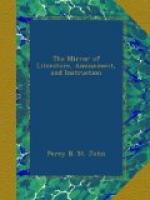Why were parks and inclosures usually attached to priories?
Because they were receptacles of game for the clergy of rank, who at all times had the privilege of hunting in their own possessions. At the time of the Reformation, the see of Norwich only was in the possession of no less than thirteen parks, well stocked with deer and other animals for the chase.—Spelman.
The eagerness of the clergy for hunting is described as irrepressible. Prohibitions of councils produced little effect. In some instances a particular monastery obtained a dispensation. Thus, that of St. Denis, in 774, represented to Charlemagne that the flesh of hunted animals was salutary for sick monks, and that their skins would serve to bind books in the library. Alexander III., by a letter to the clergy of Berkshire, dispenses with their keeping the archdeacon in dogs and hawks during his visitation.—Rymer. An archbishop of York, in 1321, carried a train of two hundred persons, who were maintained at the expense of the abbeys on his road, and who hunted with a pack of hounds from parish to parish!—Whitaker’s Hist. of Craven, quoted in Hallam’s Hist. Middle Ages.
Why was hunting formerly a very convenient resource for the wholesomeness, as well as luxury, of the table?
Because the natural pastures being then unimproved, and few kinds of fodder for cattle discovered, it was impossible to maintain the summer stock during the cold season. Hence a portion of it was regularly slaughtered and salted for winter provision. We may suppose, therefore, that when no alternative was offered but these salt meats, even the leanest venison was devoured with relish.—Hallam’s Hist. Middle Ages.
Why were all the great forests pierced by those long rectilinear alleys which appear in old prints, and are mentioned in old books?
Because the avenues were particularly necessary for those large parties, resembling our modern battues, where the honoured guests being stationed in fit standings, had an opportunity of displaying their skill in venery by selecting the buck which was in season, and their dexterity at bringing him down with the cross-bow or long-bow.
Why should a deer-park exhibit but little artificial arrangement in its disposal?
Because the stag, by nature one of the freest denizens of the forest, can only be kept even under comparative restraint, by taking care that all around him intimates a complete state of forest and wilderness. Thus, there ought to be a variety of broken ground, of copse-wood, and of growing timber—of land, and of water. The soil and herbage must be left in its natural state; the long fern, amongst which the fawns delight to repose, must not be destroyed.
Why did the common people formerly call the forest “good,” and the greenwood “merry?”
Because of the pleasure they took in the scenes themselves, as well as in the pastimes which they afforded.




